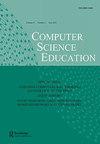了解编程任务的自动形成性反馈的有效设计
IF 2.2
Q1 EDUCATION & EDUCATIONAL RESEARCH
引用次数: 14
摘要
编程作业的背景和上下文自动反馈在促进实时学习方面有很大的潜力,但在这种背景下研究反馈设计的工作很少。目的研究不同设计的自动反馈对学生学习的影响,以及学生如何与反馈互动和感知反馈。方法对76名CS学生进行对照准实验,每组学生在编程作业中接受三种类型的自动反馈的不同组合。解决预期产出与实际产出之间差距的调查结果反馈对于有效学习至关重要;缺乏足够细节的反馈可能导致系统游戏行为。影响反馈的设计对编程任务的自动反馈的有效性有重大影响;在这种情况下,需要更多的研究来扩展关于有效反馈设计的知识。本文章由计算机程序翻译,如有差异,请以英文原文为准。
Towards understanding the effective design of automated formative feedback for programming assignments
ABSTRACT Background and Context automated feedback for programming assignments has great potential in promoting just-in-time learning, but there has been little work investigating the design of feedback in this context. Objective to investigate the impacts of different designs of automated feedback on student learning at a fine-grained level, and how students interacted with and perceived the feedback. Method a controlled quasi-experiment of 76 CS students, where students of each group received a different combination of three types of automated feedback for their programming assignments. Findings feedback addressing the gap between expected and actual outputs is critical to effective learning; feedback lacking enough details may lead to system gaming behaviors. Implications the design of feedback has substantial impacts on the efficacy of automated feedback for programming assignments; more research is needed to extend what is known about effective feedback design in this context.
求助全文
通过发布文献求助,成功后即可免费获取论文全文。
去求助
来源期刊

Computer Science Education
EDUCATION & EDUCATIONAL RESEARCH-
CiteScore
6.90
自引率
3.70%
发文量
23
期刊介绍:
Computer Science Education publishes high-quality papers with a specific focus on teaching and learning within the computing discipline. The journal seeks novel contributions that are accessible and of interest to researchers and practitioners alike. We invite work with learners of all ages and across both classroom and out-of-classroom learning contexts.
 求助内容:
求助内容: 应助结果提醒方式:
应助结果提醒方式:


